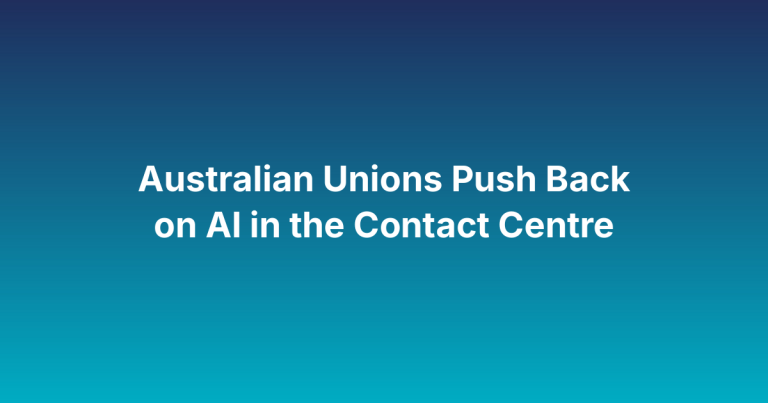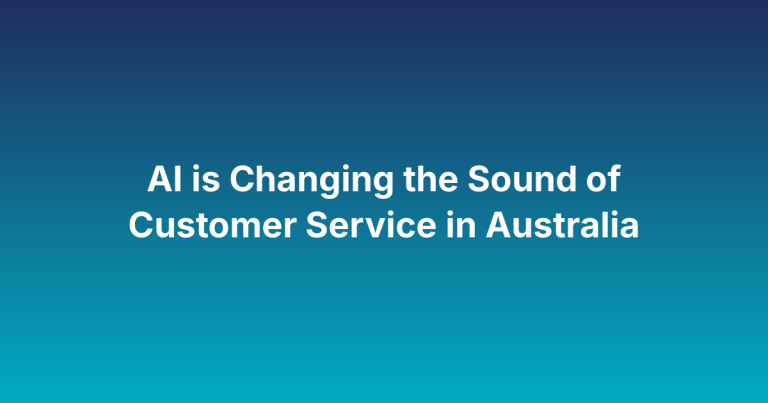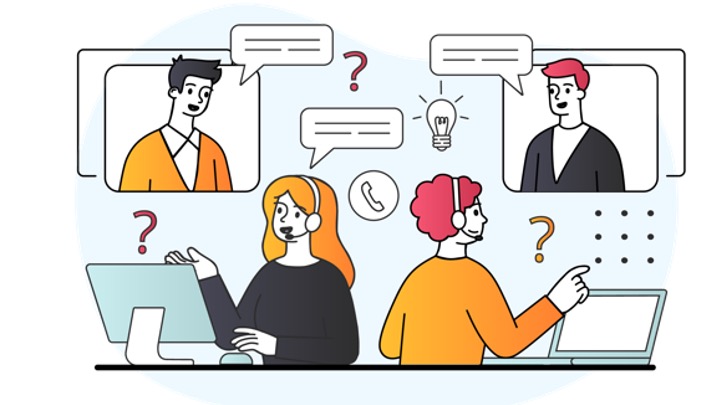The contact centre world is preparing for an important milestone. On 14 November 2025, the new-look Contact Centre Magazine will arrive with features that put it on the map for industry observers and participants alike. This special edition brings a refreshed design as well as critical content, making it an essential read for anyone following contact centre progress and innovation.
The Growing Influence of Australian Unions in Contact Centres
Australian unions have taken a leading role in shaping discussions around AI in contact centres. Their concerns reflect broader anxieties about automation and its effects on workers. In a landscape where artificial intelligence continues to transform contact centre operations, union leaders call for action. At the Productivity Summit, the Australian Council of Trade Unions (ACTU) argues that automation should not undermine worker rights and job security. Their campaign champions legislation to regulate AI, making sure workers have a seat at the table when decisions arise that will shape their professional futures.
The Rise of AI in the Contact Centre Landscape
Artificial intelligence is reshaping the contact centre industry, driving a noticeable shift in how businesses and customers interact across Australia. As technology matures, companies increasingly turn to sophisticated AI solutions, aiming to enhance both efficiency and the overall customer experience. This shift is not simply about faster response times, but also about raising expectations for service quality. Organisations are finding that AI can manage repetitive queries, analyse volumes of data instantly and improve the flow of communication between staff and clients.
As big corporations report record-breaking profits, many are outsourcing operations offshore, cutting costs but also cutting ties with local expertise and customer understanding. This growing divide highlights a critical challenge for Australian businesses: how to stay competitive while still delivering the customer experience their clients expect.
HCLTech and Microsoft are taking customer service innovation to the next level by strengthening their strategic partnership. Together, they are set to transform contact centres using cutting-edge generative AI and cloud solutions. This collaboration promises to redefine customer interactions, making them faster, smarter, and more personalised.
Driving Innovation in Contact Centres with Generative AI
As part of this initiative, HCLTech will become the exclusive professional services partner for the existing Nuance Enterprise Professional Services contracts, a Microsoft unit until January 2024. This shift marks a major milestone in their collaboration and will see more than 550 Nuance employees join the HCLTech team, further enhancing its expertise in the rapidly growing Contact Centre as a Service (CCaaS) market.
To facilitate this transition, HCLTech is launching a “Nuance Migration Factory,” a dedicated program designed to migrate Nuance’s advanced contact centre solutions to Microsoft Dynamics 365 Contact Centre. By adopting Dynamics 365 as its preferred platform, HCLTech aims to provide businesses with a seamless integration of professional services, self-service applications, and AI-driven tools like Microsoft Copilot.
A Partnership Shaping the Future of Customer Experience
The partnership also includes a comprehensive suite of services, such as system integration, application development, and migration support, all underpinned by AI transformation expertise. This robust offering is designed to help businesses adopt next-generation tools and provide a superior customer experience.
Anil Ganjoo, Chief Growth Officer for the Americas at HCLTech, highlighted the company’s dedication to driving innovation, saying that HCLTech is taking a significant step forward in leading AI-powered advancements within the expanding CCaaS market. He further emphasised that the collaboration with Microsoft reflects a mutual commitment to enhancing customer experiences through cutting-edge technology solutions.
Sharing similar excitement, Charles Lamanna, Microsoft’s Vice President for Business and Industry Copilot, praised the strengthened collaboration with HCLTech. He noted that the partnership aligns with their shared goal of utilising AI to revolutionise the CCaaS industry, emphasising that this joint effort is setting the foundation for a transformative era in customer service.
HCLTech, a global leader in technology services, employs over 220,000 people across 60 countries. For the year ending December 2024, the company reported impressive consolidated revenues of USD 13.8 billion. With expertise spanning digital transformation, engineering, cloud computing, and AI, HCLTech serves industries ranging from financial services and healthcare to manufacturing and telecom.
This partnership highlights the increasing role of artificial intelligence in reshaping industries worldwide. By combining HCLTech’s global reach and technological expertise with Microsoft’s advanced AI capabilities, the two companies are setting the stage for a smarter, more efficient future for customer service.
Transforming Customer Service with AI and Cloud Solutions
For businesses, the integration of AI-powered tools into contact centres offers immense potential. From automating repetitive tasks to providing hyper-personalised customer support, these solutions are designed to save time, reduce costs, and improve satisfaction. For customers, it means quicker resolutions, more accurate assistance, and a seamless service experience.
As the partnership unfolds, businesses and customers alike are eager to see how these innovations will transform their day-to-day interactions. It’s clear that the future of customer service is here, and it’s being shaped by the combined efforts of HCLTech and Microsoft.
What’s your take on AI stepping into the customer service space? Do you believe these advancements will create a better experience, or do you still prefer the personal touch of human interaction?
Following the weekend incident that saw the Commonwealth Bank of Australia (CBA) inadvertently double-charge customers for purchases, the limitations of automated customer service have come sharply into focus. Amidst rising frustrations, the bank’s contact centre was left unprepared, directing anxious customers to a pre-recorded message that failed to address their immediate concerns. For many individuals living paycheck to paycheck, discovering their accounts overdrawn due to false charges had devastating consequences. Grocery purchases and necessities became out of reach, intensifying the urgency for human interaction in moments of crisis.
CBA has been at the forefront of technological innovation in banking, recently launching trials of an AI platform called Hey CommBank, designed to enhance customer interactions. This initiative, powered by Amazon’s cutting-edge technology, aims to revolutionise how clients engage with the bank, allowing for rapid responses and tailored financial advice. Yet, in this specific crisis, the harsh reality surfaced: when technology fails, customers seek the empathetic ear of a human representative. The inability to communicate directly with someone who can address their worries and offer reassurance left many feeling abandoned at a time when they needed support the most.
While CBA’s exploration of AI holds promises for efficiency and cost savings—potentially replacing thousands of local call centre jobs—the recent incident serves as a powerful reminder of the human element in customer service. Chief Data and Analytics Officer Andrew McMullan envisions a future where customers interact with AI in familiar and convenient ways, yet the bank must proceed carefully. Automating responses may streamline operations, but the risk of incorrect or insensitive AI-generated replies raises questions about the success of such a system, particularly when emotions run high and stakes are personal.
In the eyes of critics, including the Finance Sector Union, CBA’s approach towards increased automation seems to disregard the value of its workforce and the needs of its customers. The union has called for greater transparency and consultation, arguing that the push towards AI should not come at the expense of essential human jobs and the quality of customer service. The fear of diminishing roles, especially as the bank has already shifted some positions offshore, has created a noticeable unease among staff and customers alike.
The situation highlights crucial paradox in the banking sector’s rush to adopt AI: while automation can drive down costs—potentially saving CBA up to $600 million in call centre expenditures—it risks alienating the very clients who contribute to those profits. The need for genuine human connection during stressful financial situations cannot be understated, and replacing the empathetic human touch with an AI response may ultimately prove detrimental to customer trust.
As CBA continues its trials with Hey CommBank, the bank finds itself at a crossroads. The promise of technological advancement is tempered by the urgent need for human compassion and understanding. Customers expect a lifeline in turbulent times, not a faceless algorithm. The challenge for CBA will be finding a balance between the efficiencies of AI and the irreplaceable value of personal interaction, especially when its customers need it most. In a world where banking increasingly intertwines with technology, the fundamental truth remains people still need to talk to people.
Successful customer-centric businesses understand the critical role played by a robust CX Quality Assurance (QA) program.
Not only can QA guide continuous improvement in product and service knowledge, but it also focuses on the human elements of customer interactions. It helps agents align their behaviour with your organisation’s expectations. QA measures the things that agents can control. It provides a foundation for feedback, coaching, training, and professional development for the broader team.
When it comes to customer service, contact centres serve as the primary interface for businesses to engage with their customers. They can build or break your organisational reputation with customers, co-delivering the experience your customers remember and talk about. Traditionally, the success of these centres has been measured through key performance indicators (KPIs) such as Average Handling Time (AHT), Net Promoter Score (NPS), Customer Satisfaction (CSAT) and First Contact Resolution (FCR)
We all know the COVID pandemic accelerated the global shift toward remote work, transforming the way businesses operate across industries. For contact centres in Australia, this was a game changing moment, where previously considered impossible proved to be not only possible but effective. Now that the dust has settled, what are we seeing in contact centres, what are the predictions for the next 12 months, and have we been able to reach a middle ground that works for all stakeholders?












